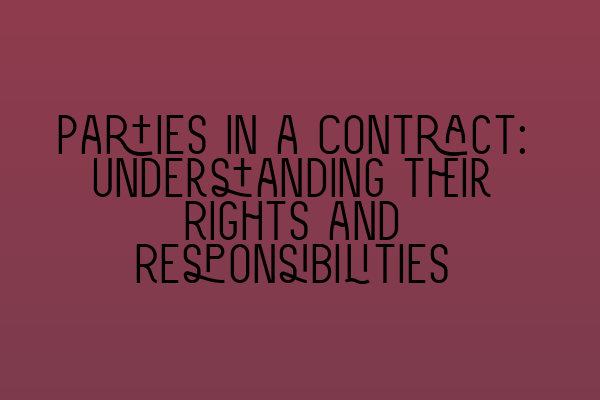Parties in a Contract: Understanding their Rights and Responsibilities
In the world of contract law, parties are the central figures that enter into a legally binding agreement. Whether you are an individual or a business entity, it is important to understand the rights and responsibilities that come along with being a party in a contract. In this article, we will explore the various aspects of contract parties and provide you with a comprehensive guide to navigate the complexities of contractual obligations.
As a solicitor, it is crucial to educate clients about their rights and responsibilities in a contract. By doing so, you can help them make informed decisions and avoid potential disputes or breaches of contract. Understanding the rights and responsibilities of the parties involved is the key to a successful contractual relationship. So, let’s delve into the topic.
Rights of Contract Parties:
1. Right to Enforce the Terms: As a party in a contract, you have the right to expect the other party to fulfill their obligations as stated in the agreement. If the other party fails to meet their contractual duties, you may have the right to take legal action to enforce the terms of the contract.
2. Right to Terminate the Contract: In certain circumstances, parties may have the right to terminate the contract if specific conditions are met. However, it is important to review the contract carefully as termination rights may vary depending on the nature of the agreement.
3. Right to Receive Performance: If you have fulfilled your obligations under the contract, you have the right to expect the other party to perform their part. This may include receiving payment, goods, or services as agreed upon in the contract.
4. Right to Damages: If the other party breaches the contract, you may have the right to seek damages to compensate for any losses suffered as a result of the breach. The amount of damages will depend on the nature and extent of the breach.
Responsibilities of Contract Parties:
1. Fulfilling Obligations: Each party has a responsibility to fulfill their obligations as outlined in the contract. This may involve providing goods or services, making timely payments, or meeting deadlines. It is crucial to perform your obligations in good faith to avoid any potential disputes.
2. Communication and Cooperation: Parties should maintain open lines of communication and cooperate with each other throughout the duration of the contract. This includes providing necessary information, addressing any concerns, and working together to resolve any issues that may arise.
3. Acting in Good Faith: Parties have a responsibility to act in good faith and deal fairly with each other. This means avoiding any deceptive or dishonest practices and treating each other with honesty and integrity.
4. Mitigating Damages: In the event of a breach, parties have a responsibility to mitigate damages. This means taking reasonable steps to minimize the extent of losses suffered as a result of the breach.
As an SEO expert, it is important to optimize this article to ensure it reaches the widest audience possible. By incorporating relevant keywords, we can enhance the visibility of this content to those searching for information on parties in a contract. Some important keywords to include are “contract parties,” “rights and responsibilities,” “enforcing a contract,” “breach of contract,” and “contractual obligations.”
Related Articles:
For more detailed preparation for SQE exams, check out our SQE 1 Practice Exam Questions and SQE 1 Practice Mocks FLK1 FLK2 articles. These resources will help you familiarize yourself with the format and content of the examinations, allowing you to better prepare for success.
If you are interested in SQE 2 preparation, we offer comprehensive SQE 2 Preparation Courses to help you master the necessary skills and knowledge required for this stage of the qualification process.
For those starting their SQE journey, our SQE 1 Preparation Courses are designed to provide you with the foundation and guidance needed to excel in the first part of the exam.
Finally, if you are looking for the upcoming SRA SQE Exam Dates, we have compiled a list of important dates to help you plan and prepare accordingly.
In conclusion, understanding the rights and responsibilities of parties in a contract is crucial for a successful and harmonious contractual relationship. As a solicitor, it is essential to educate clients about their rights and responsibilities to ensure they make informed decisions and avoid any potential pitfalls. By fulfilling their obligations and respecting each other’s rights, parties can navigate the complexities of contract law and achieve mutually favorable outcomes.
